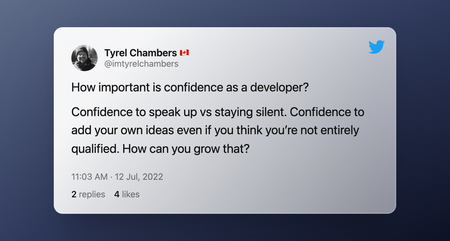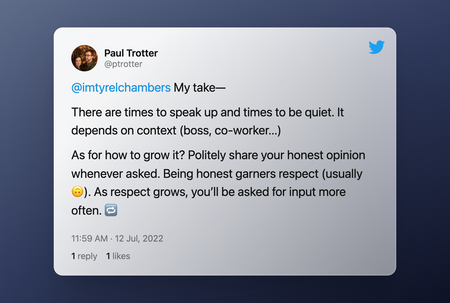Back
How to gain confidence as a junior developer
I think having confidence is one of the most epic mind-games known to man. It's not about your skill necessarily, but it's about how you perceive yourself in relation to your peers or coworkers.
It often comes down to being inside your own head convincing yourself of things that aren't always the case. We've all been there, especially in new situations where we feel like we need to measure up and at a moments notice, all of a sudden, we don't feel like we belong and that's actually normal, believe it or not.
This post is about my experience as a junior developer and how I've dealt with and managed this feeling; and how I still deal with it!
So, let's talk about "How to gain confidence as a junior developer".
What it feels like
So, what does a lack of confidence feel like? I'm so glad you asked! I write this knowing my current coworkers will see this, potentially, and in that case, "hey guys and gals, thank you for helping me get my confidence on track!".
I've been developing websites for about 8-9 years at the time of writing this, and yes, I know, posts about imposter syndrome are such low-hanging fruit, I wonder why that is? I mean, that's rhetorical.
My lack of confidence has always been tied to how I perceive myself in relation to my peers. I work with some pretty brilliant people and sometimes, when my brain goes into a fog and I'm asked a relatively simple question, that's when I feel the most "unconfidant".
In my opinion, a lack of confidence could go hand-in-hand with imposter syndrome, I guess that's not so much of an opinion as it is a matter-of-fact.
The feeling of not measuring up can be overwhelming and I'm sure if you've felt this in any sort of capacity, you know what I'm talking about. The feeling that everytime you speak they might think that you don't belong there, but we will actually get to the reality of that soon.
The truth
While we all feel this way at times and we think that we should probably just be quiet, the fact of the matter is we should do the opposite. The more we hide away and refuse to break out of this mental jail we've put ourselves in based of our false perception of reality, the greater that hold will become and the less likely we will be to grow.
Everyone from the bright-eyed and bushy-tailed junior developer to the most senior of developers feel this uneasiness often. You can ask anyone you know who you deem to be smarter or more gifted or insert adjective here than you and they will say the same thing.
You have a decision to make
We come to face-to-face with a very interesting problem.
-
On one hand we can stay safe and secure in the eyes of others while battling our own demons. We can keep thinking that we will never measure up as we stumble blindly through our career making it harder on ourselves than it needs to be
-
On this hand, we can speak out and dispel these myths we've been leading ourselves to believe about the word around us. This brings us out of our own darkness and on our way to the light
I've had many conversations about this exact topic because it's one I've struggled with for a while - I've already said that, but knowing it can be managed and for a large part, put aside, is comforting. Even more than that, knowing that people feel the same as me across the experience spectrum is reassuring.
So we have this big decision in our way. Either we cower, or we rise up and shake our fists in the air! Think Braveheart or Gladiator, whatever get your heart pumpin'.
What do you want for yourself? Do you want to:
- live in constant fear and state of unease?
- always feel like you're not good enough?
- stagnate where you are?
The list goes on, but I think you get what I'm saying. If we want more for ourselves and our mental health, I don't think we can sit idly by as our own thoughts keep us trapped.
It doesn't go away
That's the truth; it doesn't. All we can do is manage our expectations of ourselves in order to keep these intrusive thoughts at bay.
Everyone is on the same playing field where we are all just trying to do the best we can and make cool things in the process. We try to help others succeed while helping ourselves too.
Do you know how many times I've spoken to others with years of experience and heard their thoughts on this? Probably not, but nonetheless! The answer is: a lot.
Along with experience in code, or design, or whatever the case is with you, also comes strategies to deal with these thoughts.
Tips for managing your confidence
I asked my very close friend and fellow developer what he would say to a junior developer who expressed these same feelings we've covered in this post.
For reference, he is a very talented and experienced Ruby on Rails engineer and I keep his words close to heart.
"1. Unless you wrote this here language, you cannot measure up to time and experience - everyone has their part to play and we wouldn’t hire you unless we thought you couldn’t hack it.
2. All questions are dumb to someone. All questions serve a purpose to someone… the questions you ask are YOUR questions and anyone who thinks they’re dumb or doesn’t answer them, has no right to be in this field. The only way we can get to where we need to go is by getting there together."
I also posted a tweet asking about how to grow confidence.

And here were some of the replies.

Now these people have a lot more experience than me, so what they have to say means a lot.
The going theme is if you want to gain confidence as a developer, you need to step out, show yourself that your ideas and thoughts are valid, get feedback, feel a bit better, ask another question, feel a bit more validated, and you keep repeating this.
However, even though our ideas won't always be validated, maybe we come up with an idea that isn't necessarily the direction to go, that's totally fine too. That allows you to learn and grow which in the end still works to build your confidence.
Perhaps you aren't at a place to contribute with ideas yet?
These are a few notes I've written down that I try to practice often:
- Help other devs with their own work and be involved with troubleshooting. Even offering to just be a rubber duck (someone to bounce ideas off of, or just being there to be someone they can explain their thought process to)
- Your opinion is important: share it even if you're unsure of its merit.
- Ask questions; speak up; get noticed
- Putting yourself in these situations will get you used to the feeling, but eventually you'll see that your ideas are valid and people are pretty decent
- Bonus: a good work environment certainly helps
Give yourself a break
Don't judge yourself so harshly and as I write this, I need to take my own advice and will forever need a reminder. Take it easy. You're okay, it's going to be okay. Everyone started out exactly where you are. Your own experience and thought process is unique; you have value.
There's no secret sauce or magic button to poof this all away, but there are things we can do to manage these thoughts. Lean on those around you. Be vulnerable and let them know what you're feeling. Give them the opportunity to support you and help you, as everyone should.
Take a break, take it easy, don't judge yourself too harshly. We're gunna make it.